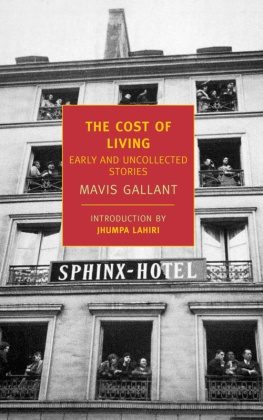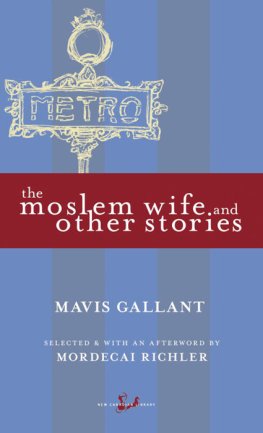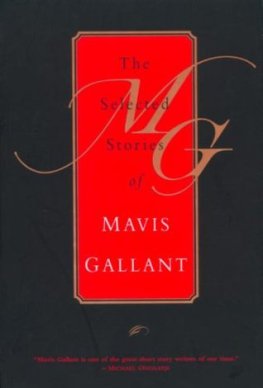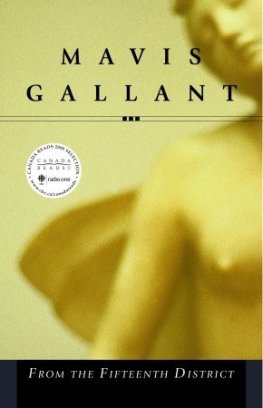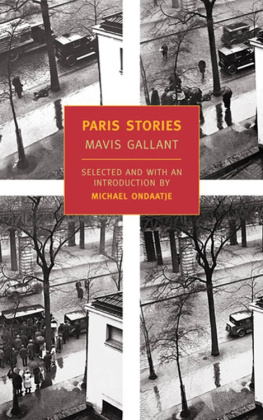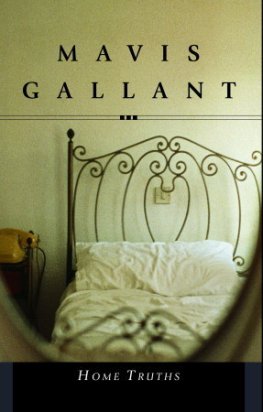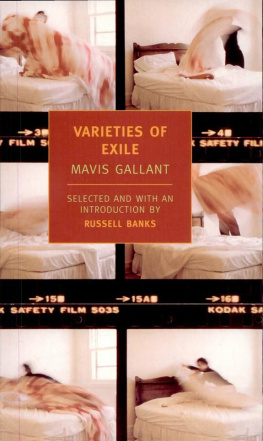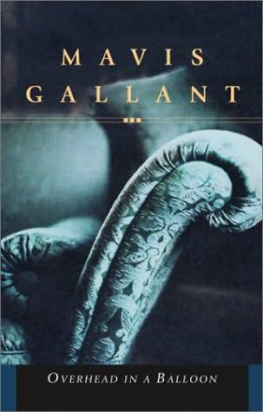NEW YORK REVIEW BOOKS
CLASSICS
THE COST OF LIVING
MAVIS GALLANT was born in Montreal and worked as a journalist at the Montreal Standard before moving to Europe to devote herself to writing fiction. After traveling extensively she settled in Paris, where she still resides. She is the recipient of the 2002 Rea Award for the Short Story and the 2004 PEN/Nabokov Award for lifetime achievement. New York Review Books Classics has published two previous collections of Gallants stories, Paris Stories, selected and introduced by Michael Ondaatje (2002), and Varieties of Exile, selected and introduced by Russell Banks (2003).
JHUMPA LAHIRI is the author of the short-story collections Unaccustomed Earth and Interpreter of Maladies, and of a novel, The Namesake. Her interview with Mavis Gallant appeared in the summer 2009 issue of Granta.
THE COST OF LIVING
Early and Uncollected Stories
MAVIS GALLANT
Introduction by
JHUMPA LAHIRI
NEW YORK REVIEW BOOKS

New York
Contents
Introduction
I HAPPENED to have the privilege of interviewing Mavis Gallant while the present collection was being assembled. Sitting with her in February 2009 at the Village Voice Bookshop in Paris, I asked how she thought her stories, published over the course of half a century, had changed. I dont compare, she replied. Its just a straight line to me. To prove her point, she briefly lifted, with her fingers, an apricot-colored necklace that rested against her chest. Theyre like the beads on this.
The twenty stories here were published during the first twenty years of Gallants career, between 1951 and 1971. They were written prior to the age of fifty; she turned eighty-seven just as this volume went to press. Many are culled from her first two collections, The Other Paris (1956) and My Heart Is Broken (1964), and also from In Transit, which was published in the late Eighties but contains earlier work. One story, originally published in The New Yorker, is a chapter from her first novel, Green Water, Green Sky (1959). In fact, all but three of these stories initially appeared in The New Yorker. None were included in The Collected Stories, published in 1996, which compiled only a fraction of Gallants work, and a good third of them have never been collected in a book at all. They are arranged in chronological order. The earliest, Madelines Birthday, was published in The New Yorker on September 1, 1951. It is among more than one hundred stories by Gallant that the magazine would accept.
Madelines Birthday was the second story Gallant submitted to The New Yorker; the first was returned with the inquiry, Do you have anything else you can show us? At the time, she was a twenty-seven-year-old reporter at the Standard in Montreal. Gallant was born in Montreal in 1922, ten years after John Cheever, ten years before John Updike. Along with Cheever and Updike, she kept company, in the pages of The New Yorker, with Donald Barthelme, J.D. Salinger, Frank OConnor, and Sylvia Townsend Warner, all of whom were publishing fiction there regularly during the Fifties and Sixties. Most of Gallants New Yorker stories were edited by William Maxwell; My Heart Is Broken is dedicated to him. Before Madelines Birthday was accepted, she had already resolved to move to Paris and was determined to make her living exclusively as a writer of fiction. The sheer bravado of this decision, particularly for a single woman of that period, is astonishing. Gallant simultaneously abandoned a reliable paycheck and her country of origin in exchange for an artists life on foreign soil. The New Yorker remained her home across the ocean; the magazines steady support through the years was crucial to her, just as the steady stream of stories she contributed were for the magazine.
Readers of Gallants fiction tend to associate it with Canada and France, and Michael Ondaatje, Russell Banks, and Douglas Gibson have all made selections of her work that highlight those attachments. But between the ages of thirteen and eighteen, the years following her fathers death and her mothers remarriage, Gallant lived in and around New York City, a place she told me she loves, while attending a series of schools, sometimes as a boarder. These were the years leading up to World War Two, of the Great Depression and FDRs second term as president; Duke Ellington and his orchestra were playing at the Cotton Club, and the Empire State Building had recently been completed. Many of Gallants earliest stories reflect her encounter with the United States: the characters in Going Ashore, One Morning in May, The Picnic, and Autumn Day are all Americans, and many of them are New Yorkers. Thieves and Rascals takes place entirely in Manhattan, in its apartments and on its sidewalks, with the Museum of Modern Art, Grand Central Station, and Columbia University contributing to the backdrop. Madelines Birthday is set just outside New York, in Connecticut, but as in many suburban tales, the city and its ways are an implicit presence throughout.
Part of Madelines predicament is that she is a city child stuck in the country. She is the by-product of a broken marriage; her mother lives in Europe, and her father has remarried a woman shes never met. She is consequently a vagabond: The days of her lifetime had been spent in so many different placesin schools, in camps, in the houses of people she was or was not related tothat the first sight of day was, almost by habit, bewildering. A student at boarding school, Madeline ends up living alone in a Manhattan apartment for three weeks because her mother has forgotten to instruct her to go to the home of Mrs. Tracy, a family friend, for the summer. Once the oversight is rectified and Madeline is safely installed in Connecticut, Mrs. Tracy believes shes saved Madeline from neglect, while Madeline, accustomed to her independence, feels like shes been taken hostage. Madeline is half girl, half woman, a creature at once precocious and vulnerable. She is neither a child, like Mrs. Tracys six-year-old daughter, Allie, nor an adult, like Mrs. Tracy, whose husband works in the city and comes home only on weekends. On the morning of her seventeenth birthday, Madeline dreams of receiving a dollhouse, but her stepmother sends an unsuitable evening gown instead. Along with Madeline, Mrs. Tracy has taken in a German student named Paul, a boy orphaned by the war. Rounding out the cast of characters is Doris the maid, running an electric blender in the kitchen, and finally, offstage but central to the drama, there is Edward, the part-time patriarch of the household.
The maiden publication of any major writer is of interest, but Madelines Birthday introduces a voice that is preternaturally mature. For a relatively fleet, satirical tale that isolates only an hour or two of human drama, it is surprisingly capacious, and also unsettling. It is a double portrait of adolescent angst and alienation on the one hand, and the false order and forced cheer of domesticity on the other. Part of its complexity is due to the fact that we have access not just to one or two but several points of view. This is the narrative equivalent of what acrobats do as they leap from one swinging bar to anothera feat ambitious enough in a novel, forbidding in the restricted confines of short fiction. The startling precision of Gallants language, her agility as a storyteller, and her uncanny ability to distill, in a handful of words, the inner states of her charactersall are amply evident in this striking debut. Of Madelines intolerance for Paul, with whom she must share a bathroom, Gallant writes, They did not even have a cake of soap in common.
Next page
